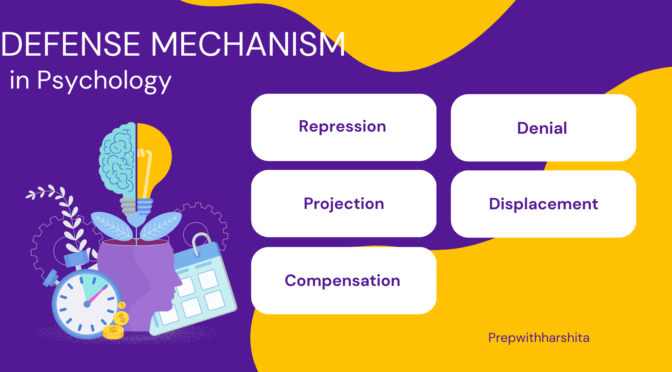In psychology, defense mechanisms are unconscious psychological strategies that people use to protect themselves from feelings of anxiety, guilt, or shame.
What is Defense Mechanism?
Defense mechanisms operate at an unconscious level and help people avoid unpleasant emotions by distorting or denying reality.
Some common Defense mechanisms in Psychology are:
- Repression: Keeping unpleasant memories or thoughts out of conscious awareness. In case a person sees the accidental sudden demise of a beloved friend or family member, this painful experience may be excluded from his conscious self leading him to become amnesic to this experience.
- Denial: Refusing to acknowledge or accept the reality of a situation. In this, the person ignores or refuses to acknowledge reality which is not acceptable or agreeable to him. If a person is feeling the stress of an unpleasant topic he, may turn away from that
- Projection: Attributing one’s own negative thoughts, feelings, or impulses to others. In projection, people blame others for one’s own shortcoming, mistakes, misdeed, unacceptable impulses, thoughts and desires. Projection is a tendency being observed in human behavior for ego protection.
- Displacement: Redirecting emotions from their original source to a less threatening target. In displacement the person shifts his feelings of hostility and anxiety from the person who is the real cause to another person. Displacement is a way out in difficult emotional situations.
- Regression: Reverting to immature behavior or earlier patterns of coping in response to stress.
- Regression is a defense mechanism in which one performs reverted behavior. The decline in attention of parents towards an elder child due to a new addition to the family may result in the elder one reverting to bed wetting and other infantile behavior to draw parental attention.
- Rationalization: Justifying one’s behavior with logical explanations that disguise the real, unconscious motives. While using rationalization mechanism one thinks logically and offers socially approved reasons in order to justify one’s behavior. Though one knows that his action is immoral and unreasonable.
- Identification: Modeling one’s behavior and thoughts after another person as a way of coping with anxiety. Identification may operate as a defense mechanism by increasing feelings of worth and protecting the individual against self devaluation
- Introjection: Taking in and internalizing the values, attitudes, or beliefs of others to the point where they become a part of one’s own self-concept. Introjection as a defence mechanism involves the acceptance of the other’s values and norms as one’s own even when they are the opposite of one’s previous assumptions.
- Compensation: Counterbalancing perceived weaknesses or shortcomings by emphasizing or exaggerating one’s strengths in other areas. People make an effort to draw attention away from a defect or a weakness.
Also Visit: Prep with Harshita
These defense mechanisms are not inherently good or bad, but they can become problematic if they are used excessively or inappropriately and prevent people from facing and addressing their problems in a healthy and productive way.


